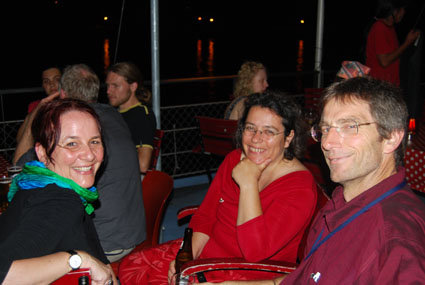Yesterday I did a press conference on behalf of the Congress organisers on the subject of nuclear disarmament. Christian Schönenberger from the Swiss Foreign Office joined us, as did Rebecca Johnson, Vice-Chair of ICAN.
Christian Schönenberger referred not only to the excellent speech by Micheline Calmy-Rey, the Swiss Foreign Minister in the plenary that morning, but also to the study that caused such a stir at the NPT Review Conference on “Delegitimising Nuclear Weapons“. The fact that nuclear weapons contravene international humanitarian law is a recurring theme, both in New York and here in Basel, and is fast becoming the central argument for the abolition of nuclear weapons. That might seem like a no-brainer for us but on the other hand but needs to be said repeatedly, especially since our friends at “Global Zero” are pushing the argument of fear against terrorism as being the main issue.
Since IPPNW and ICAN have the humanitarian aspect at the centre of their arguments for the abolition of nuclear weapons, I attempted to explain to the journalists present why that was so. And other than what would happen to people if nuclear weapons were used, which has been well documented by IPPNW, both in the case of accidental nuclear war and a so-called limited exchange (which would of course still be global because of the impact through the resulting smoke and drop in global temperature causing failure of harvests and mass starvation). But the point I wanted to make is that it is a humanitarian issue right now, because of the diversion of resources for nuclear programmes and our continuing failure to understand what kind of security humans need in the 21st century.
Take Pakistan as an example. Back then, when the decision was taken to build the nuclear bomb, the then Premier Zulfiqar Ali Bhutto said (and I don’t have the exact quote to hand) that even if Pakistan had to eat grass, they would make the bomb. Well, they are doing that now, because there is not enough money to help the people of Pakistan feed themselves in the face of these terrible floods. The diversion of resources into the military has left Pakistan unable to cope with this catastrophe.
This shows that investment in our security is completely inadequate. Houses are not built to withstand natural disasters, emergency relief is pitiful, even in daily life there is no protection from the big killers like malaria, dirty water, HIV, etc. Security is instead based on nuclear weapons, a weapon that cannot be used because of its own humanitarian and environmental impact.
It is time, in the 21st century, to understand that climate change and disease are the threats to our security and nuclear weapons do not protect us from them, so they are useless.
Time to retire the bomb.
Xanthe Hall, Basel, Aug 28 2010

March 1, 2011 at 11:13 am
[…] post originally published on Nuclear Abolition: For A Future Filed under: nuclear weapons, political writing, security, Uncategorized […]